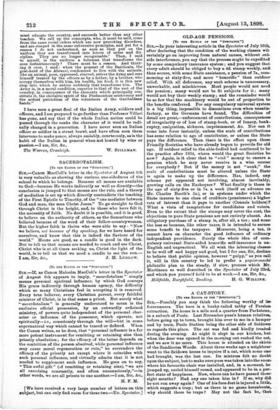THE ITALIAN ARMY. (To THE EDITOR OF THE " SPECTATOR.1
SIE,—The name of Professor Villari is known to all who interest themselves in Italian history or literature as amongst the first living Italians, whether as patriot or scholar, or of those who interest themselves in the social condition of the people of Italy. The following passages from an address pronounced by him on the centenary of Savonarola, and dealing largely with the most pregnant question of the pre- sent state of Italy, will not fail to impress your public with
confirmation of what I have said of the Italian Army in the columns of the Spectator :—
" When I went to Sicily after the outbreaks of 1893, I heard the peasants there using the most violent language against the taxgatherers, landlords, and municipalities which oppressed them. And, on the other side, I heard landlords, tax- gatherers, and municipalities say that the pretensions of the peasants increased day by day, and it was necessary to repress them by force, otherwise nothing would ever be accomplished. Returning one evening to the H6tel des Palmes at Palermo, I found myself at the table d'h6te next to a major of cavalry. He, conversation engaged, began to say, love our soldier, I have for him a profound admiration. You cannot imagine the great and noble qualities he has, the generous actions be is capable of.' And this agreed with all the observa- tions I made in the villages I visited. Everybody else was evilly spoken of, but everybody spoke well of the Army, which still had been obliged to put down the disorders by force. Soldiers and officers were everywhere received with brotherly goodwill. How can it be, I asked myself, that the two classes of society which in the village attack and destroy each other, in the Army love and praise each other ? and I could find no explana- tion. Perhaps, I said, they are people from the upper and central sections of Italy more advanced in civilisation than we of the South. But in the recent disturbances occurring in Tuscany and Lombardy, we could recognise a savage outburst of class hatreds. And on this occasion another superior officer said to me Don't make any mistake, it is the Army which
must educate the country, and succeeds better than any other teacher. We call up the conscripts, who, it must be said, come from the same social orders which are now provoking disorders, and are steeped in the same subversive principles, and yet for a reason I do not understand, as soon as they put on the uniform they are transformed into lovers of order and dis- cipline. They are no longer recognisable.' Then, I said to myself, is the uniform a talisman that transforms the an instantaneously ? There must be a reason. And think- ing it over, I said : when the peasant of the Basilicata, the goat-herd of the Abruzzi, condemned to live with the animals, like an animal, poor, oppressed, starved, enters the Army and sees himself treated by the officers as by a father, by a brother, who occupy themselves with him, his health, his food, it is this new step into which he enters suddenly that transforms him. The Army is, in a moral condition, superior to that of the rest of the country, in consequence of the elements which principally con- stitute it, the chivalric spirit of the Piedmontese aristocracy and the ardent patriotism of the volunteers of the Garibaldean bands."
I have seen a great deal of the Italian Army, soldiers and officers, and I am prepared to go further than Professor Villari has gone, and say that if the whole Italian nation could be passed through the ranks the character of it would be radi- cally changed in a generation. I have never seen an Italian officer or soldier in a street brawl, and have often seen them intervene to make peace, always amiably, courteously, as is the habit of the Italian in general when not heated by wine or passion.—I am, Sir, &c.,



































 Previous page
Previous page